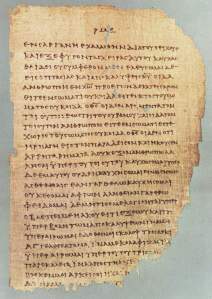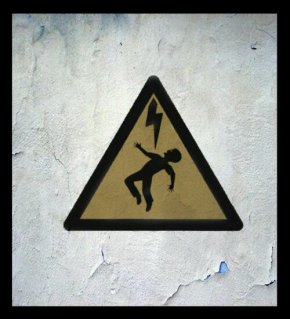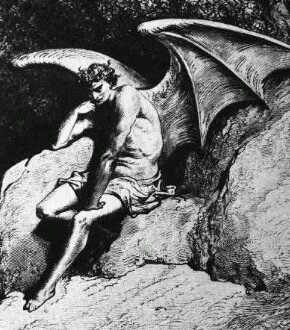2 Corinthians 7:8-10, “For even if I grieved you with my letter, I do not regret it—even though I did regret it since I saw that the letter grieved you, yet only for a little while. 9Now I rejoice, not because you were grieved, but because your grief led to repentance. For you were grieved as God willed, so that you didn’t experience any loss from us. 10For godly grief produces a repentance not to be regretted and leading to salvation, but worldly grief produces death.”

There is, of course, much discussion concerning the “letter” or “epistle” referred to by the apostle Paul in verse 8. There are at least five theories concerning the biblical etymology and development of the books known today as 1 and 2 Corinthians. These theories are discussed in the NIV Study Bible and the Life Application Study Bible. The NIV Study Bible tells us:
“Some think Paul here refers either to 1 Corinthians or to 2 Corinthians 10-13, but more likely he refers to a letter now lost that he wrote shortly after his ‘painful visit.’” –Philip E. Hughes, NIV Study Bible
This “painful visit” is mentioned by Paul in 2 Corinthians 2:
2 Corinthians 2:1, “So I made up my mind that I would not make another painful visit to you.”
Philip E. Hughes continues:
“This former visit could not have been the one he made to Corinth at the time when the church there was founded in response to the preaching of the gospel. Therefore he must have paid a second visit, which is confirmed by [2 Corinthians] 12:14; [2 Corinthians] 13:1.” –Philip E. Hughes, NIV Study Bible

These aforementioned verses read:
2 Corinthians 12:14, “Now I am ready to visit you for the third time, and I will not be a burden to you, because what I want is not your possessions but you. After all, children should not have to save up for their parents, but parents for their children.”
2 Corinthians 13:1, “This will be my third visit to you. ‘Every matter must be established by the testimony of two or three witnesses.’”
Paul, therefore, is stating that his visit to the Corinthians is to be his third. His first visit was apparently the founding of the church at Corinth itself, so we have a “missing” second visit. Concerning this the NIV Study Bible says:
“The second visit probably took place between the writing of 1 and 2 Corinthians, though some hold that it occurred before 1 Corinthians was written.” –Philip E. Hughes, NIV Study Bible

So, we can already see that there is some disagreement in when these lost letters of Paul were written, how many there were, and if indeed the letters in some way corresponded to the visits themselves. The Life Application Study Bible takes another stance on the issue.
“’That severe letter’ refers to the third letter (now lost) that Paul had written to the Corinthians. Apparently it had caused the people to begin to change.” –Life Application Study Bible
“Paul visited Corinth on his second missionary journey and founded a church there. He later wrote several letters to the believers in Corinth, two of which are included in the Bible. Paul’s first letter to the Corinthians is lost.” –Life Application Study Bible
The Life Application Study Bible cites that this lost letter is referenced in a passage in 1 Corinthians 5:
1 Corinthians 5:9-11, “When I wrote to you before, I told you not to associate with people who indulge in sexual sin. 10But I wasn’t talking about unbelievers who indulge in sexual sin, or are greedy, or cheat people, or worship idols. You would have to leave this world to avoid people like that. 11I meant that you are not to associate with anyone who claims to be a believer yet indulges in sexual sin, or is greedy, or worships idols, or is abusive, or is a drunkard, or cheats people. Don’t even eat with such people.”
The Life Application Study Bible continues to explain:
“[Paul’s] second letter to them is our book of 1 Corinthians, his third letter is lost.” –Life Application Study Bible

The Life Application Study Bible cites that this additional lost letter is referenced in a passage in 2 Corinthians chapters 2 and 7:
2 Corinthians 2:6-9, “Most of you opposed him, and that was punishment enough. 7Now, however, it is time to forgive and comfort him. Otherwise he may be overcome by discouragement. 9I wrote to you as I did to test you and see if you would fully comply with my instructions.”
2 Corinthians 7:12, “My purpose, then, was not to write about who did the wrong or who was wronged. I wrote to you so that in sight of God you could see for yourselves how loyal you are to us.”
The Life Application Study Bible states:
“[Paul’s] fourth letter is our book of 2 Corinthians. Second Corinthians was written less than a year after 1 Corinthians.” –Life Application Study Bible
“Paul wrote 1 Corinthians to deal with divisions in the church. When his advice was not taken and their problems weren’t solved, Paul visited Corinth a second time. That visit was painful for both Paul and for the church [2 Corinthians 2:1]. He then planned a third visit but delayed it and wrote 2 Corinthians instead. After writing 2 Corinthians, Paul visited Corinth once more.” –Life Application Study Bible
Despite what one may conclude about the letters to the Corinthians and the existence or, rather, non-existence of missing letters, it is apparent that when one comes to Christ we feel sorrowful for our sin, of that which was manifest in both the old creation and the new. Sorrow can imply that we feel remorse for wronging someone, God, man, or even self, and this sorrow becomes known and abundant once our eyes are opened by Christ. For in that moment we, in our hearts, know how we were supposed to act if we were indeed obedient in the Lord. Yet, it is because of this disobedience that Christ had to be nailed unto the cross, that we may have forgiveness of our trespasses. Once this is made clear, Godly sorrow envelopes us, but for the purposes of repentance, rather than a means to drive us into despair. This is where sorrow of the world leads, despair, hopelessness and eventually death. Not of the body, for everyone goes through that, rather the death of the spirit. The true death where there is no hope.

Despair has several like traits, but in my own personal observation, it seems to multiply burden and with an overwhelming feeling of sorrow, this makes hope in one’s life crumble into dust. In this position many slip down the well-worn worldly path towards self-destruction and/or become allied with the enemy. There is an ecclesiastical meaninglessness to life, which makes one focus on the Lord, and there is a worldly meaninglessness that makes one focus upon the self. In regards to the latter, they seek not to protect the self, but rather engage in actions of carnal gratification which eat at a person from the inside out, until they are just a shell of what they might have been, tragically spending all effort in chasing after material rather than the eternal.
Christians, of course, are not granted a lifetime without hardship when coming to the cross. In fact, there are many throughout history, also in contemporary times, that have experienced greater hardship due to their suffering which is directly related in the sharing of the message of reconciliation, that is the Gospel of Jesus Christ. Great persecution and martyrdom still occurs to this day, despite the gospel of “tolerance,” the world supposedly subscribes to. More on current examples of martyrdom and persecution, check out, “The Voice of The Martyrs” site.
Yet, there is a vast difference between the hardship of those in the world, and the hardships of those who belong to Jesus Christ. It’s not found in the nature of the hardship, but rather in the response. The world under hardship lacks hope, while those in Christ have it in abundance and there are several ways our hope is apparent.

With Christ we have the hope in Him that He cares about us and our daily lives, and indeed this is truth. We pray that He will strengthen us, lift us out of such snares and the painful circumstance we may find ourselves in and put us back on our feet. Furthermore, we know that when we pass from this world, the problems that confront and confound us here, will cease to be on the other side of eternity, where we will truly live.
Godly joy stems from these things which are some of the cornerstones of the faith and experienced in all Christians, as well as the faith and love that the Spirit instills and perfects within us. Yet, Christians are not immune from breaking away from this hope and grace to chase joy and happiness in the pleasures of the flesh. I myself am guilty of this very thing.
Besides being apart from Christ, one of the problems with this strategy is that you will never come to a place of fulfillment. In fact, you may desire more and more, chasing after “new” experiences, but never realizing how similar those experiences are. Eventually you come to a point where you gain exactly the opposite of what you were looking for: despair. Trying to choke out the feeling of despair by worldly means brings one to the point of calamity, and it is only by Jesus Christ that one can be pulled back from the edge of the precipice.

True joy is found with Christ Jesus, who offers it freely to those who follow Him. Christ went through that feeling of despair as He was beaten and executed that we wouldn’t have to. Christ offers us a way back from the tomb of despair, that our lives may have meaning, and in that we may have joy.


































 By far the greatest burden of man is sin and Christ carried this burden, not just for the individual, but for all mankind. It was a burden that only He was fit to bear and take upon the cross to have sin put to death with Him, that anyone who believes upon Christ, their sins may not be counted against them, for their sins, geivious and heavy upon our Lord, will have Perished along with Christ. Yet, unlike Christ, they will remain vanquished, so that like Christ, who on the third day arose victorious, we may come into our new dwelling at the appointed time of the resurrection of man.
By far the greatest burden of man is sin and Christ carried this burden, not just for the individual, but for all mankind. It was a burden that only He was fit to bear and take upon the cross to have sin put to death with Him, that anyone who believes upon Christ, their sins may not be counted against them, for their sins, geivious and heavy upon our Lord, will have Perished along with Christ. Yet, unlike Christ, they will remain vanquished, so that like Christ, who on the third day arose victorious, we may come into our new dwelling at the appointed time of the resurrection of man. Christ carried the disgusting burden of sin because of His great love of us. Even as He bled out, our savior prayed for those who pierced His flesh. We tend to put blame and despise the Romans or Jews who sent Christ to that tortuous edifice, but the shocking realization hits us one day, that we are as guilty as them, for it is because of our disobedience that Christ went to the cross. Therefore, we might as well been hammering the nails through his hands ourselves.
Christ carried the disgusting burden of sin because of His great love of us. Even as He bled out, our savior prayed for those who pierced His flesh. We tend to put blame and despise the Romans or Jews who sent Christ to that tortuous edifice, but the shocking realization hits us one day, that we are as guilty as them, for it is because of our disobedience that Christ went to the cross. Therefore, we might as well been hammering the nails through his hands ourselves. We should mourn and weep for this as well as be in awe at the fathomless love that was expressed that day. Jesus prayed for us instead of cursing us. Let us praise Him. He washed away our curse and guilt with His holy blood, the only thing worthy of atoning for the faults that marred our spirits and ripped open a great chasm between us and God. Jesus bridged that gap, took on our sin and provided the ultimate example of how we should love. As Christ lifted up our burdens, let us rejoice in the freedom He has granted us, but at the same time, let us be diligent and mindful of each other, for hard times and seemingly insurmountable hardship come into each and every one of our lives at some point. Though we can’t be as Christ completely, let us be representations of Him and pick up our brothers and sisters burdens and sacrifice our own comfort so that we may fulfill in some measure what we were called to be, representatives of our Lord Jesus Christ. Amen.
We should mourn and weep for this as well as be in awe at the fathomless love that was expressed that day. Jesus prayed for us instead of cursing us. Let us praise Him. He washed away our curse and guilt with His holy blood, the only thing worthy of atoning for the faults that marred our spirits and ripped open a great chasm between us and God. Jesus bridged that gap, took on our sin and provided the ultimate example of how we should love. As Christ lifted up our burdens, let us rejoice in the freedom He has granted us, but at the same time, let us be diligent and mindful of each other, for hard times and seemingly insurmountable hardship come into each and every one of our lives at some point. Though we can’t be as Christ completely, let us be representations of Him and pick up our brothers and sisters burdens and sacrifice our own comfort so that we may fulfill in some measure what we were called to be, representatives of our Lord Jesus Christ. Amen.



1 Corinthians 15:20-23, “On The Chaos of Reason, The Firstfruit, and The Transfiguration”
"The Transfiguration", by Lodovico Carracci. oil on canvas, c. 1594
I find that my inquisitive nature is both a blessing and a curse, as will become apparent in my commentary concerning this passage of Scripture. The mind is a astonishing thing, though it can also serve evil, but it was gifted by God that we may seek out the wonderful mysteries of Him. Yet, our faith must surpass our own understanding, for God is beyond the reason of man. Rather than use this as an excuse, the inability to reason God and His ways, is perfectly reasonable. If we were able to reason God, we would need to be Him, which is impossible. Much like you can know a person, you can’t really know them to a full degree unless you are actually one in the same, which trespasses against the law of identity. Thus, we see only as a poor reflection and though we can approach God using the mind, the fullness is unattainable.
We can stretch our minds to have great understanding of the Lord, and such wisdom is provided by Him, but there is a line past which man cannot reason, where thought becomes defused, a chaos of reason, if you will. This is an important thing to realize, if one who is as inquisitive as I am begins to get tripped up from unanswered questions, as it used to do with me. A couple other things to realize are:
In this verse, it tells us Christ was the Firstfruit. What is meant by this? Christ at the time of His resurrection, arose with a new glorified body. One that is free of decay and will never pass away. He was the first to receive such a body, but won’t be the last. While Christ justly received His new body, we, those who belong to Him, will receive it according to His grace. If death came through the disobedience of one man, as 1 Corinthians tells us, how much more can the perfect obedience of Christ negate the disobedient act of he who cursed all man?

Again, His body is the first of the new bodies which we will be granted at the time of our passing from death into life. Christians will be raised again, with the blood of Christ covering us and we will be seen as righteous, through grace, and we will acquire our new bodies through the Son of Man. Our bodies will be unperishable and not be bound to the physical world and it’s laws as we now know it.
This certainly is a glorious truth that we eagerly await. When the Lord comes in glory we will be free of the struggle, the pain, the anguish, and the disgusting nature of sin which stains us all. What a glorious day it will be! However, here my inquisitive mind interjects and asks a question, I almost can’t help but ask, and as of now I have no answer. The question is this:
If Christ is the Firstfruit, and I have faith He is, then how could He talk with both Moses and Elijah (Matthew 17:1-9)? Were they not resurrected?
One answer seems rather obvious. Elijah never died, but was whisked off to heaven in a whirlwind accompanied by a chariot of fire and horses. For this reason I believe the two witnesses mentioned in Revelation 11:1-14 will be Enoch and Elijah, for both in the scriptures did not experience physical death, but were taken straight up into heaven in bodily form. Thus, both have yet to die, which the two witnesses will be subject to before being raised up again to life.
The famous Hank Hanegraaff, who is well renowned for providing biblical answers, said on his blog concerning this question:
“There is no reason to think that they (Moses and Elijah) had yet received permanent resurrected bodies.”
Truly, the Bible doesn’t say that at all. Both were beloved by God and may have been called from Abraham’s Bosom to speak to the Lord. Also, the fact that the transfiguration occurred at this very time, might indicate, that in this miraculous event, Christ was transcending the world prior, of course, to His crucifixion. However, this is all speculative, and exactly what form Moses, whom the Law was given, and Elijah, whom was the restorer of the Law, took might be a mute point when juxtaposed with the “pre-incarnate” glory manifest in Christ. Whatever the answer is, perhaps it lies in the chaos of reason and I would not even be able to grasp a full answer, and thereby the inquisitive nature is overshadowed by that of faith. My faith in the Scripture, which I have no reason to disbelieve, tells me that Christ was indeed the Firstfruit, and Moses and Elijah were in form of something different than the glorified body, for Christ had not yet became glorified, so the opportunity for the two men to receive their new bodies had not yet come to pass.
We must be wary not to include those things in the Bible that it does not say. In this case it does not say that they, Moses and Elijah, were in bodily form, so there is no reason, truly, to conclude that they are. Though, again, at least one, Elijah, could have been. Another form is possible, for we know people after their earthly death go into Hades, or Abraham’s bosom. Therefore, it follows that they still exist in some form and perhaps it was this form that, at least Moses took, on the Mount of Transfiguration. Finally, the mountain itself is unknown, but three suggestions have been made concerning its identification, though admittedly this is somewhat irrelevant. The three candidates offered by scholars and tradition are, Mount Tabor, Mount Hermon, and even Mount Sinai, the latter being the most unlikely of the three due to its location.
Thanks again to Terie for her insight, a true Princess of The Lord and The Queen of Grammar. 🙂
Share this: